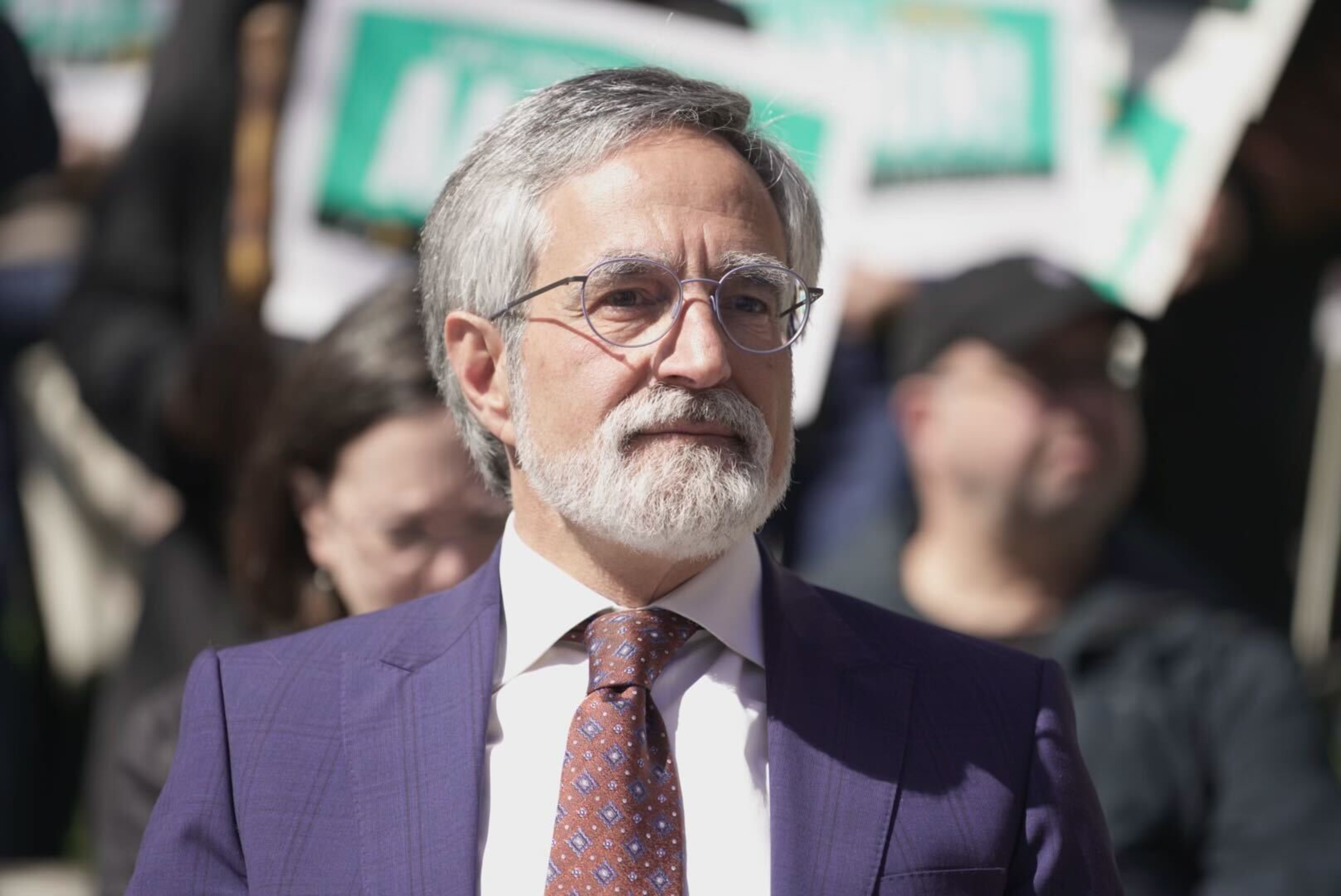Aaron Peskin spent the bulk of his 17 years on the San Francisco Board of Supervisors as the city’s progressive kingmaker.
But when he traipsed through the familiar, gold-adorned doors of City Hall for an April 23 gathering with his District 3 successor and a top aide to the mayor, he was submitting to the throne — not sitting on it.
The 8 a.m. meeting (opens in new tab) with Danny Sauter, a moderate member of the board who bested the progressive candidate that Peskin endorsed in last fall’s election, included a discussion over designating part of North Beach as a historic district. That plan has support from community members and property owners, but Sauter and his YIMBY allies view it as an attempt to stymie development.
No coffee was served — and the negotiations didn't result in a brokered deal.
"Their level of legal and technical understanding was surprisingly limited," Peskin said of the meeting.
The episode highlights the current reality of San Francisco's political factions: Peskin and other progressives may not hold the reins of power anymore, but they are still prodding and poking at City Hall nine months after voters elected Mayor Daniel Lurie, who enjoys a moderate majority on the 11-member Board of Supervisors. Interviews with nearly a dozen progressive leaders and political observers in San Francisco reveal how the liberal faction is working to reassert its relevance and regain momentum with voters ahead of the 2026 election.

Their movement is buoyed by the Democratic Socialist Zohran Mamdani’s success in New York City's mayoral primary, and by the political fallout of President Donald Trump’s attacks on blue states and cities — along with the mayor's unwillingness to vocally take Trump to task for these moves.
They also view upcoming battles over Lurie’s rezoning plan and the September recall election against moderate Supervisor Joel Engardio as opportunities to notch some wins and get their political groove back.
“The mistake would be to think that progressives are over in San Francisco,” said former progressive Supervisor Tom Ammiano. “I know the fire is still there. I know there will be change.”
The pendulum swings
Moderates swept last year’s elections by painting progressive leaders in City Hall as incompetent on resolving basic issues such as homelessness, crime, and street disorder. Their campaigns received an unprecedented injection of tens of millions of dollars from center-right tech titans, and they benefited from voters’ fears over public safety issues that have increasingly taken precedence over concerns about affordability.
Jane Kim, a former supervisor and current director of the California Working Families Party, considers those gains temporary. “What you see is that there are cycles,” Kim said. “These things swing back and forth.”
She said San Francisco has always had boom cycles, in which progressive politics rise in popularity based on affordability issues, and bust periods, in which moderates capitalize on concerns over street conditions.
Nearly a year after the election, Kim and other progressives already see cracks forming in the moderate coalition.
The first signs of struggle started with Trump’s aggressive immigration raids in June in Los Angeles, which moved north to San Francisco. Lurie has been mostly quiet in his response to the White House’s immigration policies, offering a tempered condemnation that has outraged progressives who want City Hall to take a more forceful tone against the sweeps.


“Lurie is not going to pretend Donald Trump doesn’t exist forever,” Peskin said. “San Franciscans of all political stripes don’t want a mayor who is silent.”
Lurie’s reticence has created opportunities for progressives to lead the resistance in San Francisco, with freshman Supervisor Jackie Fielder emerging as the most obvious leader for the local anti-Trump movement.
“She ran a smart campaign,” said Ammiano, noting that Fielder did not have the same resources as her more moderate competitor yet won “quite handily.”
Fielder, who did not respond to an interview request, has leveraged her role as the most vocal supervisor to criticize Lurie’s $15.9 billion budget. The mayor’s austerity measures this year cut funding for nonprofit services and loosened rules around the use of tax money spent on homelessness services that he wants to instead direct toward shelter, much to the chagrin of progressives and supporters of permanent supportive housing.
“She’s performing well,” Ammiano said of Fielder. “Looking at her phenomena, there are things to learn.”
The Mamdani effect
Nearly 3,000 miles away, Mamdani’s shocking rise as the Democratic nominee for mayor of New York has offered another beacon of hope for local progressives — and a potential blueprint for their path back to power. Mamdani beat former New York Gov. Andrew Cuomo in the June primary on a campaign message laser-focused on increasing affordability for all, with policy proposals such as free transit and freezing rent.
His simple, tight messaging that focused more on a big vision than on wonky policies paid off, said Jen Snyder, a progressive consultant who was an aide to former Supervisor Dean Preston, a Democratic Socialist who lost reelection last year.
“Progressives have been told for a really long time to temper their ideas to meet this large, moderate voter bloc who may not be ready for something that is radical,” said Snyder. “People want bold, big, tangible, new solutions. Zohran broke out of the block.”

San Francisco State University political science professor Jason McDaniel said Mamdani was able to successfully thread the needle with a socialist vision that appealed to YIMBY groups (opens in new tab), and this could be a winning recipe for the movement in San Francisco, where progressives have often aligned themselves with NIMBY organizations.
“Mamdani talked about affordability that still has an option to being pro-YIMBY,” said McDaniel.
One San Francisco progressive taking note is Saikat Chakrabarti, who is challenging Speaker Emerita Nancy Pelosi for her congressional seat next year and has shown enthusiasm for the YIMBY-adjacent “abundance” movement.
“We’re not going to be able to turn this decline around with some small reforms. We have to do the big structural changes that we all know are long overdue,” Chakrabarti said during his July campaign launch. “And if we don’t do it, if we don’t turn this decline around and deliver real prosperity for a vast majority of Americans, then authoritarians are going to keep winning.”
Coming battles
For now, however, San Francisco progressives do not appear to be flirting with YIMBYism. Far from it.
Facing a state mandate to build more housing, Lurie in April proposed loosening zoning restrictions across the city and allowing for more multi-family projects, including on the west side, where opposition to development has traditionally been strongest.
But homeowners, small businesses, and tenants' rights groups are forming an alliance with the preservationist left in their fight against the rezoning plan, said Julie Pitta, president of the Phoenix Project, a progressive organization that has criticized the flow of tech money into politics.
“We’re looking at something very broad,” Pitta said of the coalition.
Pitta said Proposition K, the November 2024 ballot measure that permanently closed the Great Highway to cars and converted the stretch of concrete into a park, has galvanized opposition against the rezoning plan.

In just over a month, a recall election will be held against Engardio, the Sunset supervisor who championed Prop. K.
The Sept. 16 recall has divided moderates, with one faction that includes urbanists and YIMBY organizers wanting to support Engardio, and another that considers the supervisor's unpopularity a liability for their movement.
Lurie has repeatedly dodged (opens in new tab) questions about whether he supports Engardio, despite the supervisor being a reliable vote in support of the mayor’s policy agenda. The Democratic County Central Committee has also delayed an endorsement vote on the recall, with sources saying moderate members are split on the issue.
If Engardio is recalled, Lurie would likely appoint a moderate member in favor of his rezoning plans. But progressives still sense an opportunity.
They have spent the last several weeks scheming over who they could run against a Lurie-appointed supervisor in 2026 if Engardio is booted, leaving them in a better position to fight back against moderate policies on the board.
As for Peskin, 61, he isn’t writing off another shot to commandeer City Hall. After a four-year cooling off period, he can run another time for the board in 2028.
“I have no plans to run for any office. That is a true fact,” he said. “But you never know what crosses one’s path.”

